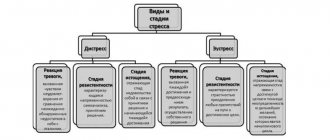Over the past two decades, studying the effects of stress on the body has become one of the most important areas of medical science. This is no coincidence, because almost every person faces stress. Depending on how we respond to stress, it can be beneficial - if it pushes us to act more effectively. Or, on the contrary, it is harmful - when it gets out of control and overwhelms us.
A negative reaction to stress is similar to normal mood swings.
Loss of appetite and insomnia can have a harmful effect on you and your baby. You cannot allow these symptoms to torment you for a long time - moving into the second and third trimesters. Learn to deal with stress.
You must approach this issue constructively and do everything to regain your peace of mind. Here are some tips for coping with stress.
Talk about what makes you nervous.
Don't keep your fears inside, give them a way out in the form of words. Alternatively, you can try to psychologically lean on your husband. Every day in the evening, but preferably not right before bed, discuss your worries and concerns with him.
Together, it will be easier for you not only to find solutions in difficult situations, but also to simply remain calm.
And also treat troubles with humor. Besides your husband, you can talk to someone else. For example: with relatives, a friend or even a doctor.
A good solution would be to enroll in courses for expectant mothers or some classes for pregnant women. There, you will be able to communicate with other mothers to understand that other pregnant women have the same problems. You can also try to find a hobby, for example, knitting or something else.
If conventional remedies do not help, consult a psychologist.
Symptoms
The following signs of increased stress are observed in every pregnant woman. If you find at least half of the symptoms from this list, you need to reconsider your lifestyle.
- Sleep problems. May manifest as nighttime insomnia or daytime sleepiness.
- Apathy. Characterized by indifference to everything, including eating, walking and personal care.
- Anxiety states. They are expressed by overwhelming thoughts about possible diseases, complications during and after childbirth.
- Distrust of loved ones. A woman in such a state perceives everyone around her with hostility.
- Nervousness. Develops into irritability, frequent crying and whims.
- Frequent heartbeat. Increased heart rate occurs separately from physical activity.
- Headache. It may take the form of a migraine, dizziness, and be accompanied by nausea.
- Longing , a feeling of doom and hopelessness.
- Phantom pain. Occur in various parts of the body, medical examinations cannot reveal their physical cause.
- Skin rashes and itching. Similar to an allergic reaction or urticaria, they are temporary.
Find out how to deal with insomnia in the first and third trimester.
Eliminate the source of stress.
Try to avoid situations that throw you off balance. If you are overwhelmed with different things, give up those that are not very important to you. If you have too much work and housework to do, then put some of it aside or assign it to someone else.
Learn to distribute and control your time! Mastering time management skills can take you a long way in this regard.
Sometimes it helps to sit down with a notebook and organizer to make a to-do list. Planning will help you feel that you have everything under control and all your affairs are “sorted out.” With this, you can cope with the feeling of being drowned in the chaos of responsibilities that have piled up on you.
Stress during pregnancy, it’s possible, it’s not, it’s possible...
Stress during pregnancy, you can, you can’t, you can… https://mama.passion.ru/l.php/stress-vo-vremya-beremennosti-privodit-k-astme.htm
Stress during pregnancy leads to asthma
Topic: News and Events / Pregnancy
Women who experience frequent stress during pregnancy are putting their unborn child at serious risk.
Scientists from the UK proved this in a large-scale study. Women who frequently complained of anxiety, worry and stress during pregnancy were 60% more likely to have children with asthma.
In total, the health of more than 14,000 children from 5,800 families was studied. Experts were interested in how calm women felt during the period 18-32 weeks of pregnancy.
It turned out that children with asthma were born to 16% of women who experienced stress during pregnancy, and only to 10% of women whose pregnancy was calm.
Scientists explained that the stress hormone cortisone significantly affects the immune system of the unborn baby. The higher its level in the body of the expectant mother, the more noticeably the child’s health weakens.
https://health.passion.ru/l.php/stress-na-rannih-srokah-beremennosti-grozit-shizofreniei.htm
Stress in early pregnancy can lead to schizophrenia
Topic: Health News / Children
Women who experience severe stress in the first months of pregnancy put their baby at serious risk: the newborn may develop schizophrenia.
A team of scientists from the University of Manchester analyzed the health of 1.38 million people born between 1973 and 1995. It turned out that the risk of schizophrenia and other mental illnesses is 67% higher in those whose mothers experienced stress in the first trimester of pregnancy. The data obtained once again confirmed the theory that the psychological state of the mother is of great importance even for the unborn child.
Previous research in this area has shown that stress during pregnancy increases the risk of preterm birth.
https://detskii-sait.ru/95-stress-vo-vremya-beremennosti.html
Stress during pregnancy|
Published: January 22, 2010 | How dangerous is stress during pregnancy for the unborn child?
The first pregnancy is certainly stressful, especially for a young woman who has not yet fully established the mental balance necessary to deal with the incessant demands of a helpless, dependent person.
During pregnancy, conflicts from a previous period of life come to life, as happens at any crisis moment in human life, and the young woman must re-adapt to the outside world. The essence of this adaptation of a woman on the path to maturity is to achieve a stable and satisfactory balance between fantasies, dreams and hopes and the reality of relationships with herself, her husband and child. Pregnancy, especially the first one, is a kind of crisis. Pregnancy implies the end of a woman’s existence as an independent person and the beginning of an indispensable and irrevocable mother-child relationship. During pregnancy, a calm and confident state of the expectant mother is very important. However, life sometimes disrupts it, since it may involve stress, serious situations, for example, the dismissal of a husband from his job or the bereavement of loved ones. Stress is translated as “tension, effort.” Stress is a disturbance that occurs within you as a reaction to a certain situation or activity, both external and internal. When stressed, our body, in particular our adrenal glands, begin to produce catecholamines, or so-called stress hormones, which help us cope with the situation. These hormones penetrate the placental barrier and affect the child, forming a physiological state that reflects the state of the mother. However, it is much stronger and has greater significance, since an adult develops defensive reactions that are absent in a child. If stressful situations are not too frequent, then their negative impact on the fetus is small. If the expectant mother is almost constantly in a state close to a nervous breakdown, then such overloads of the mother’s body will not slow down to affect the condition of the unborn child. Fact.
Mothers who experience constant stress during pregnancy have children born physically weak.
Severe stress reduces immunity, as a result of which both mother and newborn remain defenseless against any infection. A sharp release of adrenaline, characteristic of a stressful state, acts mainly on the muscles of the uterus, causing their tone. This indirectly affects the child by changing the pressure of the amniotic fluid and blood supply, since when the uterine tissue contracts, the blood vessels narrow and the flow of blood into the umbilical cord decreases. We are talking about very strong stress. You should not take into account a quickly passing feeling of anxiety, for example due to a dent in a car. The child is exposed only to severe stress, deep and prolonged experiences. These include, for example, poor relationships between spouses, conflicts that are constantly repeated and become a habitual model of communication. This applies, first of all, to situations where a woman feels like a victim, and not just an actively defending party. If conflict cannot be avoided during pregnancy, then it is advisable for the woman to remember the need to actively protect herself and the unborn child, and not take a passively suffering position for the sake of peace at any cost. In such situations, the help of a psychological consultant or joint attendance with your husband in childbirth preparation groups can often be useful. At the same time, it should be remembered that expectant mothers have protection - love for the baby. It is able to protect the fetus from harmful effects even in very difficult, extreme situations. It is known that external stress factors do not directly affect the unborn child and only a pregnant woman, passing them through herself, allows these factors to influence him to one degree or another. Therefore, concentrating on a positive attitude: “I’m expecting a child,” will lead to a shift in psychological emphasis from one’s own problems and experiences to the birth of a new person. In difficult circumstances, try to cope with them. Many women say that during pregnancy they had a reflex to protect their child as a being already born. In this regard, they consciously suppressed all unwanted emotions. These expectant mothers talked to the child, explained to him what was happening, and calmed him down. At this time, the child imprinted on the cellular level the information that in life there are ups and downs that can always be overcome. Thus, the foundation of a strong, resilient person was laid. You can analyze your own condition and think about ways to overcome stress. In everyday conversations, we often use the word “stress,” but each person puts his own understanding of this term. This applies to both the causes of our problems and the manifestations of our stress, anxiety and worries. There are several signs that determine that the body is in a state of stress: Constant obsessive thoughts. Trembling in hands. Heartbeat. Internal discomfort. Sleep disturbance. Feeling of hopelessness. Self-pity. Muscle tension. The emergence of aggression. Feeling of powerlessness, loss of control over the situation. The desire to isolate yourself from the world. Irritability. Headache. Cheeks are burning. Low mood. Loss of appetite. Blood pulsation in temples. Important note.
Even if you have low levels of stress, but it continues for a long time, you should take steps to identify its cause and eliminate it.
Scientists have found that chronic stress of relatively low intensity is more dangerous to health than severe but short-term stress. Exercises to relieve stress Exercise “Sources of stress.” Name the sources of stress that occur in you, that is, various reasons that cause anxiety, worry and stress. Here is part of the list, look at it, maybe you’ll see “your favorite” stress, or rather, your “most disliked” stress. Excessive stress at work. Dissatisfaction with the results we achieve in life. Lack of understanding in the family. Bad weather. Bad service, rudeness during service. A lack of money. Problems for loved ones. Lack of time. Job loss. Betrayal (betrayal) of loved ones. Parting. Increase in prices for goods and services. Theft of a wallet at the market. Road traffic accident. Unhappy love. Child's passion for slot machines. Car breakdown. Lawlessness of officials. High blood pressure. There are everyday “anti-stress measures”. Here are some of them; Communication with nature (walks in the park, forest, etc.). Music. Dream. Thoughts that others might have it worse. Pets. Chat with friends. Pour out your soul to your friend, “cry into your vest.” Treat the situation with humor. Listen to advice from a competent person. Sex. Do what you love, hobby. Watch a good video. Read a good book. Pamper yourself: buy something you've been wanting for a long time. Change your attitude towards the situation. Make your list of ways to deal with stress. Exercise “Stopping the flow of negative thoughts.” This method is used when there is “mental chaos” or “uncontrollable flow of thoughts” in the head associated with problems or stress. The method is quite effective in cases of low or medium level stress. This technique will give the best results when you are in nature (in a park, square, near the water), but it can be used in any environment. Focus on the thoughts filling your mind. Then turn your attention to the external environment (the furnishings of an apartment or office, the landscape outside the window - to any external object). Slowly moving the focus of attention from one subject to another, silently describe your feelings, trying to maintain maximum objectivity and avoid any judgments. When examining the objects of the external world with the beam of your attention, use all possible modalities (visual, auditory, tactile, olfactory). Example. “Outside the window I see a summer day. The sky is blue, clouds float across it very slowly. The clouds are white and seem fluffy. You can hear the sounds of the street: the noise of cars, the voices of people. Music is heard from a radio behind the wall. I smell a faint smell of coffee. I see a picture on the wallpaper. These are small blue flowers with golden leaves...” It is very important to perceive the mother’s world as impartially as possible, refraining from labeling. “Nice”, “pleasant”, “stupid”, “annoying” - all these words will need to be excluded from your vocabulary. In this technique, you are just an observer. The meaning of this listing is to occupy consciousness with the perception of objects and phenomena of the surrounding world, switching the focus of attention from. chewing on your stresses to explore the outside world. This exercise is used in cases of minor stress that has caused a flow of negative thoughts. When there are strong emotions, it is better to use other, stronger techniques.
Eat right.
Due to lack of time, many women eat poorly and do not follow a daily routine. All this leads to the fact that during pregnancy, your resistance to stress decreases. And in addition, it negatively affects the growth and development of the child.
Lack of discipline in nutrition for a pregnant woman is doubly harmful.
Therefore, take care of your daily menu; you will need three large meals or six small ones during the day, at a minimum.
Causes and signs of stress in pregnant women
Stress during pregnancy is common to almost every woman, even those who are giving birth not for the first time. Half of expectant mothers demonstrate severe nervous tension, which increases as the expected date of birth approaches. The most common signs include the following.
- Disturbed sleep – insomnia at night and daytime sleepiness.
- Apathy - indifference, anhedonia.
- Anxiety, obsessive thoughts and conditions.
- Irritability, tearfulness.
- Changes in blood pressure.
- Increased heart rate not associated with exercise.
- Dizziness, migraine, headache.
- Wandering pains of an inexplicable nature.
- Skin itching, exacerbation of allergies.
Stress can haunt a woman before childbirth and continue after the birth of the baby. In both cases, this is a reaction to hormonal changes and changes in life. Stress becomes fertile ground for subdepressive states.
Before giving birth, a girl may experience stress due to moral unpreparedness for the new role of a mother, fear of giving birth, fear for the well-being of the baby and the financial situation of the family after the birth of the baby. The key cause of stress is uncertainty about the partner, the father of the child.
Postpartum stress is usually caused by a weakened body, lack of sleep, lack of family support, and social isolation where a young mother finds herself after returning from the hospital. For the first time, a woman is faced with a situation where she does not belong completely to herself - the baby depends on her, and she is forced to depend on him.
Those women in labor who have already encountered depression and nervous breakdowns in the past, even before conception, are at risk.
Causes and signs of stress in pregnant women
Relaxation techniques.
Taking a warm bath (not a hot one) is a great way to relax. Pamper yourself and take a bath after a hectic day. You can listen to relaxing music during the process, it will help you calm down and take your mind off your worries. You can also fall asleep faster if you do this in the evening before bed.
Use a classic stress-relieving method like massage. Ask your husband to rub your shoulders or go to a professional.
Be sure to tell your massage therapist that you are pregnant.
Use these and other relaxation techniques to combat stress. Most of these methods are useful not only during pregnancy, but also at any other time when you need to relieve tension.
Reduce factors that trigger stress.
Maybe the problem itself is not worth the attention you are paying to it. For example, if you are nervous at work, then think about whether it is worth it. If you don’t have the opportunity to quit or change jobs, then try to go on maternity leave early. You can also try to negotiate with your boss about reducing your working hours or delegating some of your responsibilities to someone else. This will most likely help you reduce your workload and cope with stress more easily.
Remember that stress may increase after the birth of your baby. Therefore, now is the time to learn to cope with it and control yourself.
Author: Arlene Eisenberg.
What to do if you find yourself in the midst of stress?
- Focus on your breathing. Think about making it level.
- Lightly touch the tummy and mentally or auditorily talk to the baby, imagine him
- Find someone you can get support from. Sometimes just speaking up is enough.
Yes, severe prolonged stress during pregnancy certainly negatively affects the health of both the pregnant woman and the baby. But it is important to understand: it is impossible to avoid experiences in our lives. Don't hold them back. Cry if you cry. But at the same time, pregnancy is the time to learn to accept yourself, fill your life with pleasant moments, increase stress resistance and not be afraid to turn to loved ones for support.
source










